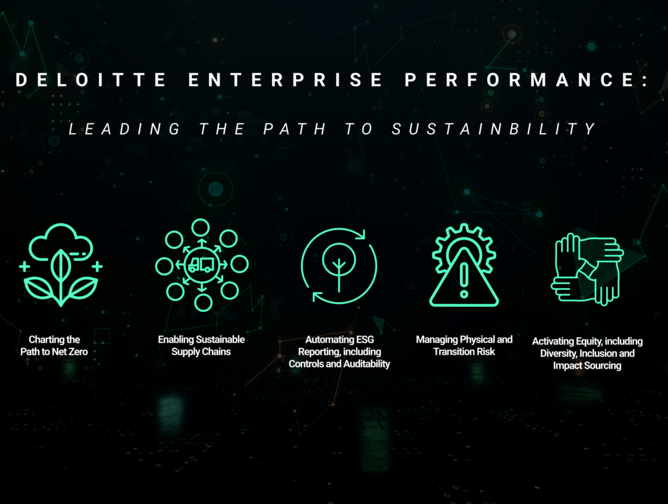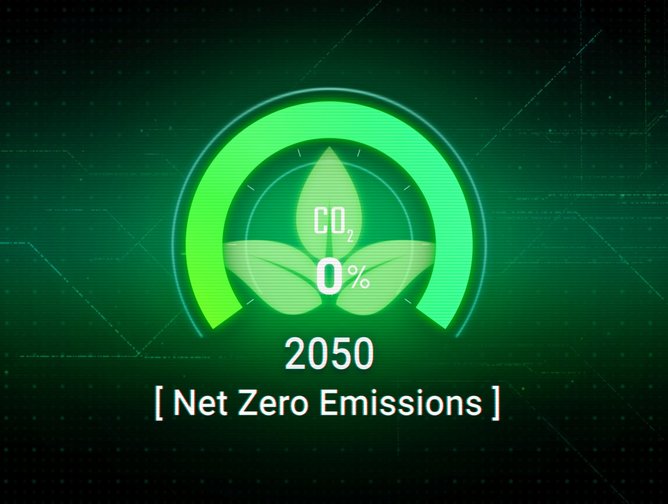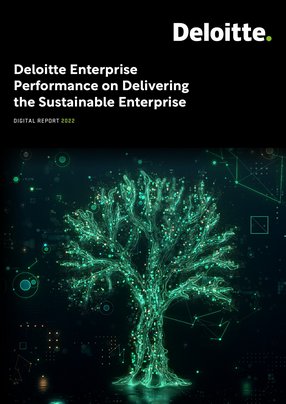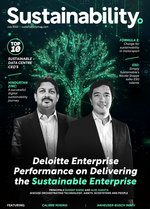Scott Birch
Good afternoon, Sudeep and Alec, thank you for spending time with us on an important enterprise topic, Sustainability. Let’s start with some introductions. Would you mind introducing yourselves?
Sudeep Singh
Nice to meet you, Scott. I'm a Principal at Deloitte Consulting, based in Southern California. I lead our Sustainability practice for Enterprise Performance (EP), the largest offering portfolio in our consulting business. To give you a sense of what that means, Enterprise Performance includes our technology-enabled business transformation practices, including ERP, finance, supply chain operations, and other operations-enhancing technologies, to help our clients with mid-office and back-office capabilities. We also manage key technology alliances and partnerships. As for my role, I have spent most of my career leading large, complex business transformation programmes for some of the largest companies in the world.
Alec Kasuya
Great to meet you as well. I'm also a Principal in our Enterprise Performance practice. I've worked in and around energy and Sustainability issues for the better part of my career, going back 15 years with Deloitte. I specialise in global services, which brings an international development focus to our corporate clients in helping them expand their operations. In this area, issues of environment and Sustainability are intricately linked. In my role, I am very excited to be teaming very closely with Sudeep and our EP leadership team, bringing our Sustainability capabilities to our clients.
Scott Birch
Let’s explore that further – can you tell me a bit about what Enterprise Performance does to help clients and the role of Sustainability within that picture?
Sudeep Singh
We work with a large portfolio of clients across industries and many of them are facing similar challenges across how technology, operations, and finance interact with Sustainability’s goals. We are helping them think through how they establish and execute on their Sustainability, climate and equity agenda; for example, their strategies to deliver net-zero operations. How does the modern enterprise operationalise and then industrialise these capabilities in accelerated timelines? Where does technology innovation, the most critical enabler, fit within the strategy? This is where we come in with our extensive experience in technology strategy and delivery capabilities.
As you can imagine, a lot of the historic Sustainability discussions to date have been manual, i.e. ‘off-line.’ These discussions were high-level strategies to satisfy external reporting regimes with limited fiduciary implications – and, therefore, accountability. We are quickly approaching a point, a level of maturity, that goes well beyond this ‘first round', and our clients are looking to implement real action. Today’s Boards and Executives are discussing and implementing Sustainability strategies that go much deeper – with interaction points across far more enterprise stakeholders, creating real employee enablement.
Our clients want to understand the landscape of options, and prioritise the pursuit of initiatives where they can make a material and measurable impact, with commitment and big investment behind it.
For example, think about new products built on circularity principles where you have to completely rethink the product life cycle. These are substantive initiatives with significant impact, which can become disruptive if not planned and implemented in a coordinated manner.
On the second part of your question – at Deloitte, we view the role of Sustainability across five main areas:
- Charting the path to net zero
- Enabling sustainable supply chains
- Automating ESG reporting and disclosures with appropriate controls and auditability
- Understanding and managing climate-change related physical and transition risk, and;
- Activating equity both within and outside the organisation through initiatives like diversity, inclusion, and impact sourcing
For each of the five areas, we help our clients in a variety of ways – this may start with a collaborative exploration and education process, a clarity of ambitions, setting the strategy and roadmap, defining and enabling measurement, and updating their core business capabilities to align with Sustainability principles, regardless of their drivers: social consciousness, consumer demand, regulatory or compliance requirements, and/or raising capital.
Scott Birch
What is your strategy when you connect with
a large client? You mentioned exploration and education – can you describe how this process begins?
Sudeep Singh
Certainly – in our opinion, Sustainability is a broad and complex topic that requires breakthrough thinking. At Deloitte, we have studied breakthroughs in great depth and have developed an immersive experience for it; we call it the Greenhouse Experience.
Alec Kasuya
To go a little deeper on the Greenhouse Experience, it is a key asset and differentiator for us, and we believe it's going to be extremely impactful and inspiring when it comes to this particular topic with our clients. For those who haven't experienced it, our Greenhouse Lab is a fully immersive and sensory experience, where we invite key client leaders to meet with us, ultimately helping them with a vision forward to inspire innovation and creativity amongst their teams. The Greenhouse Lab is typically built with three parts: explore, discovery and commitment. The goal of these sessions is to orchestrate common understanding and viability – a path forward. In essence, we are working with our clients to orchestrate their Sustainability story.
The Lab can run the gamut from the simplest notion of energy efficiency to more complex topics like purpose and equity. With Deloitte’s capability portfolio, we can go very broad and deep. We explore enterprise-specific impacts in the context of the energy transition as it relates to power, utilities and renewable energy, as well as oil, gas and biofuels. We explore regulatory environments and climate at both macro and micro levels, and the impacts that different regulatory regimes are – or will be – having on our clients’ businesses near-term, as well as the long-term planetary impacts.
Discovery via the Greenhouse is really about looking for solutions – identifying pathways that help drive to overall Sustainability goals. On the point about commitment, we are building on the foundation of the vision and getting to action, the tactical next steps, the plans, the roadmaps, the activities required to start mobilising. The Greenhouse Experience has been foundational for Deloitte for many years, in terms of our overall approach to unlocking the power of transformation, and will continue to have a similar impact with regards to Sustainability.
Scott Birch
You mentioned enterprise goals and striving to meet those goals. Broadly speaking, do you think that, with ‘all hands on deck,’ the targets for limiting global temperatures are realistic and achievable? Thinking tactically – what kind of requests have you been getting from your clients? Combined, is that cause for optimism?
Sudeep Singh
I do believe the goals are achievable. Informed by what I've seen with our clients, the kinds of investments that are going into Sustainability – with the innovation to drive it – is astonishing.
So, yes, I do believe that there is a viable path for getting to those goals. As I mentioned earlier, historically, the types of commitments we’ve seen were very superficial – that mentality has completely changed since the beginning of this year. Between consumer preferences, employee choices, risks due to climate change, ESG-earmarked capital, imminent ESG reporting, our clients are taking the topic of real action to drive Sustainability very seriously.
To expound on that further – the largest influx of inquiries have been regarding ESG reporting. With the imminent SEC reporting needs, it has taken on a life of its own. To be able to make quality and transparent disclosures that have appropriate controls, auditable, and with a high level of automation – this is a very complex challenge. We are talking about pulling data from a broad set of internal systems, and sourcing Scope 3 Emissions and other benchmark data from external sources. The data aspect of ESG reporting is overwhelming for many clients and in turn, creating capacity challenges to concurrently deliver real value-chain improvements in this area. We, along with our technology partners, are helping them solve these challenges.
One of the ways we are addressing these challenges is to onboard more clients to our ESG Reporting-as-a-Service platform. We want to make ESG Reporting more repeatable, scalable and cost effective, and free their time to focus their efforts and investments on Sustainability initiatives such as circularity, sustainable procurement, energy transition, and logistics emissions.
In our discussions, we frequently find that enterprises can be consumed by current market conditions, inflation, supply chain issues and geo-political challenges, but we have to keep in mind that Sustainability is for the long-run, and so we need to deliver strategies that consider near-term challenges but that are built to deliver on commitments that will run for decades – many enterprises have made Sustainability commitments for 2030, 2050, and beyond.
All in all, I'm optimistic. I spend a lot of time in Silicon Valley, and I have seen the kinds of innovation that we have been able to achieve over the last 20, 30 years. With the changing social climate and significant investments being made, I'm hopeful that we are applying the same kind of innovative lens to Sustainability, and we will begin to see the outcomes that will allow us to reach the goals we all want to achieve. The sheer number of start-ups and new entrants in the market is astonishing, and as enterprise-solution enablers, we haven’t even scratched the surface on the cutting-edge research and technology in the pipeline – combined with autonomous capabilities, AI, and the overall acceleration of technology-driven innovation – what we can achieve is evolving, daily. As demand matures in the next phase of technology evolution, we will see a lot more transformational capability. I firmly believe that technology innovation is the single most important enabler to achieving the warming limits established internationally.
Scott Birch
Earlier, you made reference to your Alliance network – can you explain why this is important in the context of Sustainability?
Sudeep Singh
Our Alliance network is our solution ecosystem – whether they are software vendors or other service providers. In the ERP and platform space, SAP, Oracle, Salesforce, ServiceNow, and Anaplan are some of the platforms that are well known. We are working with them to synthesise the challenges related to Sustainability, and together, building solutions and use cases to address them.
We have a strong belief that we are operationalising and industrialising the business capabilities for companies to take action on their sustainable development goals. Without the right ecosystem partners and their innovative solutions, the value proposition of technology-enabled transformation starts to diminish rapidly. You need to have the know-how, the assets, the partnerships, and aligned objectives as partners to make this happen, efficiently, measurably, and with the human change-management perspective, all together.
We also partner with all the hyper-scalers – AWS, Google and Microsoft as leading partners – to deliver scale and infrastructure. Last but not least are the growing capabilities of ESG companies. There is a wide range – many of them provide brilliant new point solutions to solve specific issues for a particular industry, and the marketplace is very dynamic. For example, many in the energy industry are fairly mature, while others are trying to tackle data issues by delivering advanced analytics – the marketplace is expanding rapidly. The expanding ecosystem of solution providers are our partners in how we solve for Sustainability, to scale the outcomes, to make sure that solutions work together and stick for the longer term. That is what we mean by ‘the benefit of an Alliance network’ – to innovate and deliver on common enterprise goals, with the leading set of innovative, industrialized and integrated capabilities.
Alec Kasuya
Going back a few points and to build on what Sudeep said initially in describing our practice as technology-enabled transformation – when we think about the complexity of Sustainability as an issue for our clients, we see Sustainability as a driver of transformation, not as a singular effort, but one that unifies the needs of divergent initiatives and stakeholders.
At Deloitte, we are uniquely positioned to bring together enterprise stakeholders; from the groups at the corporate centre, at the enterprise strategy level, stakeholders in manufacturing and supply chain, in finance, and in IT. Also, the stakeholders who have been charged with managing the employee experience. Comprehensively, that covers your buildings and facilities management, fleet management, and the operations of the
enterprise. Connecting all of that is the technology backbone, one that must continually evolve to meet the needs of the enterprise.
As we've evolved in this discussion around Sustainability and climate, what our clients want to focus on is what it really takes to reach tactical action and results – part of that is knitting together these different stakeholder groups around a common goal and common sense of purpose, when they often have potentially divergent needs.
For example, when you think about the level of information and data that's required to manage energy efficiency in a manufacturing plant, it comes down to sensor-level technology where you are measuring voltage in milliseconds. How do you roll that up in reports to strategic stakeholders or external-facing groups? From employee decision enablement to reporting, the enterprise requires an understanding of how the different aggregated data points impact the enterprise level. When we drop back down to the financial and external reporting lens, our clients are demanding that all internal and external data satisfies compliance and control requirements.
Wouldn’t it be simpler if all of this was integrated?
At Deloitte, because of our multidisciplinary focus, our belief in technology as the backbone of the enterprise – serving as the integration point that brings it all together – I think we're uniquely positioned to help our clients to bridge this gap between today’s capabilities and where we want to go to fully enable the Sustainable enterprise.
Scott Birch
A compelling vision for the future of enterprise Sustainability – thank you for your time. To conclude, can you quickly touch on Deloitte's marketplace investments in this area?
Sudeep Singh
At Deloitte, we've announced very substantial investments in Sustainability, Climate and Equity. Deloitte has committed to investing over $1bn in this area. We’re investing in talent, training 100% of our team members on Sustainability principles and strategy, developing assets and innovative solutions, and investing in our ecosystem and alliances with the intent to build a marketplace for innovative Sustainability solutions. We are all-in as a partner, investor and orchestrator to drive Sustainability forward.
We are investing heavily in assets and asset-based services, as we believe speed and scale will help our clients industrialise their capabilities in pursuit of their sustainable development goals, which, as I mentioned earlier, frees up their time to address transformative change. For clients and ourselves, Deloitte is committed to Sustainability as not just a near-term or long-term strategy, but as a permanent change; a new lens from which every strategy and decision should be assessed.
Scott Birch
A fascinating insight into how modern enterprises – and Deloitte – are taking tangible steps towards addressing Sustainability. Sudeep, Alec – thank you for your time.
Alec Kasuya
Thank you for the discussion, Scott.
Sudeep Singh
Absolutely, thank you for this opportunity to speak about our Enterprise Performance perspective on how integrated technology, processes, and people can work together
to address one of the biggest challenges of our time.




- Why JPMorgan, Deloitte, Meta & More Support Record SAF DealSustainability
- Deloitte Leads Way on Employee Upskilling in SustainabilitySustainability
- Deloitte Doubles Down on Sustainable Solutions with Gen AITech & AI
- How the Deloitte AI Institute is closing the digital divideDiversity & Inclusion (D&I)


